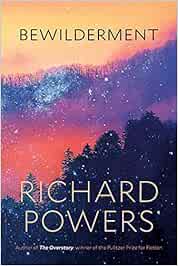4 Stars
The narrator of this novel set in the near-future is Theo Byrne, an astrobiologist. Widowed, he is raising his nine-year-old son Robin by himself in Madison, Wisconsin. Robin, variously diagnosed with OCD, Asperger’s, and ADHD, is highly intelligent and sensitive and loves all of nature, though he is socially awkward and has difficulty with anger management. Instead of psychoactive drugs that many are recommending, Theo opts for experimental neurofeedback treatment to help Robin with emotional control.
Robin is a character the reader cannot but fall in love with. He is a young boy “so ingenuous that it rattled his smug classmates.” His astute observations will have you nodding in agreement. For example, while waiting in an airport terminal, Theo and his son face a bank of television monitors while everyone receives text alerts from the President, and Robin comments, “Dad? Know how the training is rewiring my brain? His wave included all the craziness of the concourse. This is what’s wiring everybody else.” He is so attuned to the natural world and the magic of all living things: “He slowed down for the most banal things. An ant mound. A gray squirrel. An oak leaf on the sidewalk with veins as red as licorice.” His mother Alyssa was an animal rights activist, and he has become obsessed with species threatened with extinction, and sets out to do what he can to help the cause. With his father, Robin shares a fascination with the possibilities of life on other planets.
The plot unravels predictably because reference is made to Flowers for Algernon. Anyone familiar with the story by Daniel Keyes will know how this book will end. Bewilderment is, however, more than just a retelling of a classic story. It is a political and environmental commentary.
The United States has a Trumpian president who is obsessed with Twitter: “America, have a look at today’s ECONOMIC numbers! Absolutely INCREDULOUS! Together, we will stop the LIES, SILENCE the nay-sayers, and DEFEAT defeatism!!!” When Robin calls the president a dung beetle, Theo warns him that such criticism can result in a jail sentence. The separation of powers no longer exists because “Congress itself now took orders from the White House, and the appointed judges had fallen in line.” Immigration has been stopped with “a private mercenary force deployed on the southern border.” An election is held but “online conspiracy theories, compromised ballots, and bands of armed poll protesters undermined the integrity of the vote . . . [and] the President declared the entire election invalid. He ordered a repeat.” In the re-election, “another wave of irregularities were declared insignificant and the President was named the winner.” Among so many, one statement especially reminded me so much of the Trump era: “Everything had happened in broad daylight, and against shamelessness, outrage was impotent.”
The country has become anti-science: “the chaos-seeking administration had played to the Human Sanctity Crusade, slapped down the environmental movement, pissed on science.” There is a “Creation Museum and Ark Encounter” because people “had little use for science of any kind.” Funding is cut “from grade schools that taught evolution.” There is no interest in space exploration because “Apparently God had made life on one planet only, and only one country of that planet’s dominant species needed to manage it.”
Climate change has led to a host of problems. The story begins “on a day that had broken yet another all-time heat record by five degrees.” “In the record heat, clusters of lethal bacteria were spreading up and down the Florida coast.” There are other consequences: “Summer floods throughout the Gulf contaminated the drinking water of thirty million people, spreading hepatitis and salmonellosis across the South. Heat stress in the Plains and the West was killing old people. San Bernardino caught fire, and later, Carson City.” “Fresh water from a dissolving Arctic was flooding into the Atlantic, swirling the protective currents like a hand passed through a smoke plume.” There’s a Greta Thunberg character, an autistic fourteen-year-old named Inga Alder, who challenges world leaders to take immediate action for climate change mitigation and whom Robin comes to admire.
Two elements of the book bothered me. I found my interest waning at the many descriptions of possible exoplanets and the types of life forms that might exist on them. I was also disturbed by Robin’s whooping in glee at the sight of a heron catching a big fish and eating it. Though I understand the bird is not exploiting or killing the fish unnecessarily, Robin’s cheering seems excessive. This is the same child who minutes later is frantically tearing down cairns in the stream because they “destroy the homes of everything in the river”? This is the same child who screams at the accidental killing of a squirrel?
The book is heart-warming; the love between Theo and his extraordinary son and the things he does to help Robin are very touching. The book will arouse anger at the damage humankind is inflicting on nonhuman life on the planet. I shared Robin’s shock at a statistic: “Only two percent of all animals are wild? Everything else is factory cows and factory chickens and us?” And the book will break your heart. I hope sentient life is discovered on other planets, and I hope that that life proves to have done much better looking after its home than we have in caring for Earth.
Bewilderment will leave the reader bewildered at the human race.
Note: I received a digital galley from the publisher via NetGalley.

No comments:
Post a Comment